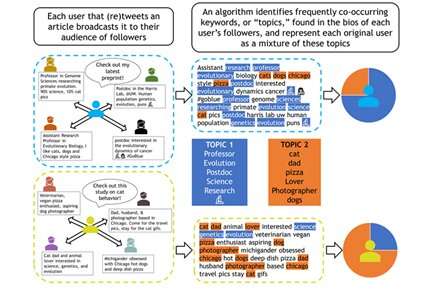Who's Tweeting about scientific research? And why?

Although Twitter is best known for its role in political and cultural discourse, it has also become an increasingly vital tool for scientific communication. The record of social media engagement by laypeople is decoded by a new study publishing in the open access journal PLOS Biology, where researchers from the University of Washington School of Medicine, Seattle, show that Twitter users can be characterized in extremely fine detail by mining a relatively untapped source of information: how those users' followers describe themselves. This study reveals some exciting—and, at times, disturbing—patterns of how research is received and disseminated through social media.
Scientists candidly tweet about their unpublished research not only to one another but also to a broader audience of engaged laypeople. When consumers of cutting-edge science tweet or retweet about studies they find interesting, they leave behind a real-time record of the impact that taxpayer-funded research is having within academia and beyond.
The lead author of the study, Jedidiah Carlson at the University of Washington, explains that each user in a social network will tend to connect with other users who share similar characteristics (such as occupation, age, race, hobbies, or geographic location), a sociological concept formally known as "network homophily." By tapping into the information embedded in the broader networks of users who tweet about a paper, Carlson and his coauthor, Kelley Harris, are able to describe the total audience of each paper as a composite of multiple interest groups that might indicate the study's potential to produce intellectual breakthroughs as well as social, cultural, economic, or environmental impacts.
Rather than categorizing people into coarse groups such as "scientists" and "non-scientists" that rely on Twitter users to accurately describe themselves in their platform biographies, Carlson was able to accurately segment "scientists" into their specific research disciplines (such as evolutionary biology or bioinformatics), regardless of whether they mentioned these sub-disciplines in their twitter bios.
The broader category of "non-scientists" can be automatically segmented into a multitude of groups, such as mental health advocates, dog lovers, video game developers, vegans, bitcoin investors, journalists, religious groups, and political constituencies. However, Carlson cautions that these indicators of diverse public engagement may not always be in line with scientists' intended goals.
Hundreds of papers were found to have Twitter audiences that were dominated by conspiracy theorists, white nationalists, or science denialists. In extreme cases, these audience sectors comprised more than half of all tweets referencing a given study, starkly illustrating the adage that science does not exist in a cultural or political vacuum.
Particularly in light of the rampant misappropriation and politicization of scientific research throughout the COVID-19 pandemic, Carlson hopes that the results of his study might motivate scientists to keep a closer watch on the social media pulse surrounding their publications and intervene accordingly to guide their audiences towards productive and well-informed engagement.
More information: Carlson J, Harris K (2020) Quantifying and contextualizing the impact of bioRxiv preprints through automated social media audience segmentation. PLoS Biol 18(9): e3000860. doi.org/10.1371/journal.pbio.3000860
Journal information: PLoS Biology
Provided by Public Library of Science





















